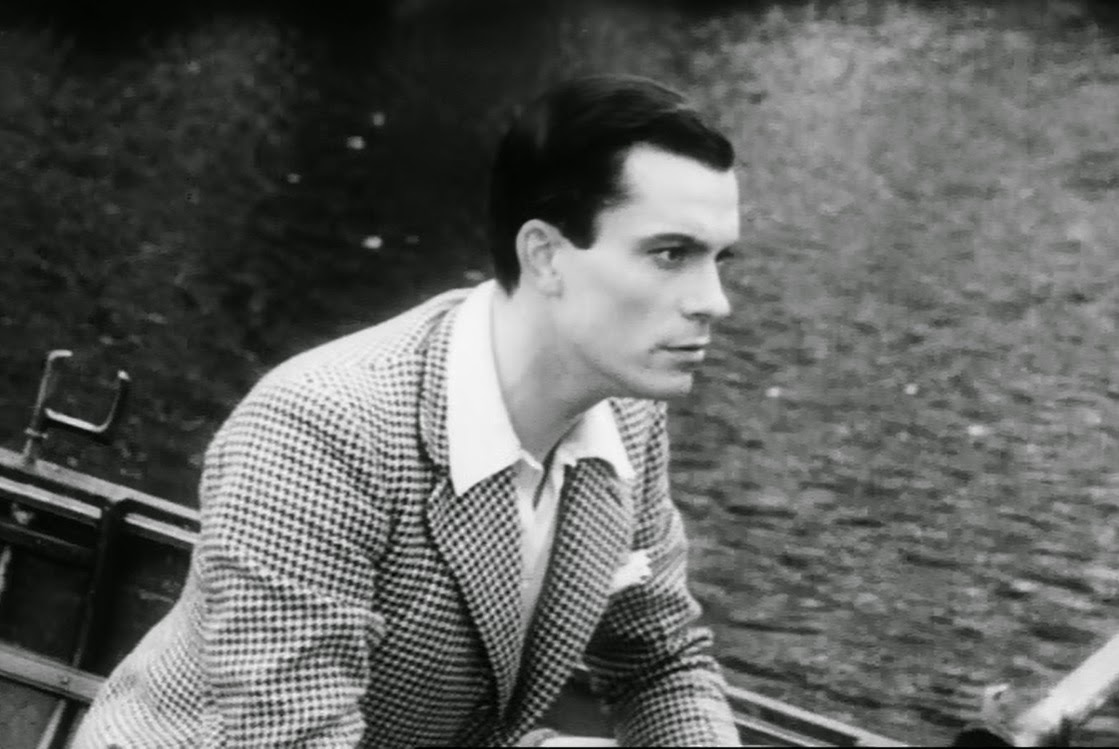Loyalties
&
Three
Men in a Boat (both 1933)
The ongoing series of ‘Ealing Rarities’ being reissued by
Network DVD aims to showcase the entire output of what was probably the
nation’s most beloved film studios. Covering the entire period from when Basil Dean
took over in 1929, through the Michael Balcon years (1938 onwards), then into
the post-Ealing years when the name remained yet the studio location had
changed, the series is a brave effort. As an attempt to show the historic
development of the studios and its output, the collection is notable yet, from
an entirely artistic point of view, a less charitable assessment has to be
made: In short, some of the films are dreadful.
Volume 12 offers a contrast between one film that has little
or nothing to recommend it (Three Men in
a Boat) …
 |
| William Austin |
… and one that is a bit of a surprise (Loyalties):
 |
| Basil Rathbone |
Where do I begin? Well the cast doesn’t really inspire one,
two of the three main characters (William Austin and Edmund Breon) ...
... are far too
old for their roles whilst the third (Billy Milton) ...
 |
| Billy Milton |
 |
| Billy Milton |
Is there anything good I can say about it? Yes, it’s short
and Billy Milton wears some quite nice outfits. That’s it really!
Here’s who else who appears:
Davy Burnaby:
Iris March:
The film also offers us a sign of how much the times have
changed, with Iris March telling Austin and Breon: “You look like a couple of nigger minstrels.”
Casual racism of the 1930s variety gets a much more rewarding treatment in Loyalties. Seeing the names Basil Dean and John
Galsworthy together on screen was somewhat off-putting. After all, anyone who
has seen the 1930 film Escape will
consider those two names a combination that strikes terror into the hearts of
any daring enter a cinema (or open a DVD box).
So, it is with enormous and unexpected relief that I can
safely report that Loyalties is
actually quite enjoyable. It’s the story of Ferdinand de Levis (Basil
Rathbone) ...
 |
| Basil Rathbone |
... a wealthy British Jewish man with an interest in horse racing, who struggles
to be accepted by many among the strata of society he mixes with. Yes, they
invite him to their house parties and engage in polite conversation, but his
religion remains a subject for much underhand comment. He may be honest, but he
isn’t ‘one of their own’, instead he’s ‘one of them’.
Made in period of both rising anti-Semitism and open
concerns about violence of such emotions, the film is open in its criticism of
the way some in modern British society continued to view Jews as outsiders.
It’s contemporary setting challenged viewers to look at their own prejudices:
this wasn’t just an issue from history, it was a modern problem – one that
arose in a world of up-to-date apartments, cocktail parties and smartly
tailored suits.
When de Levis is robbed of money whilst staying overnight
with so-called ‘friends’, his suspicion immediately falls on Captain Dancy
(Miles Mander) ...
 |
| Miles Mander |
... a down-on-his-luck war hero with whom he is already at odds
over a race horse that de Levis had purchased from him. When relationships are
tested by the accusation, society closes ranks to protect Dancy, with everyone
fearing a scandal more than they fear seeing de Levis being cheated. As he
tells them, they are happy to “chase a
man like a pack of hounds because he’s not of your breed.”
Fortunately, the film has a sense of balance: it’s not just
the upper classes whose prejudices are revealed, as another character admits: “I don’t like Hebrews. They work harder,
they’re more sober, they’re honest and they’re everywhere. I’ve got nothing
against them, but the point is they get on so.” |
| Miles Mander & Basil Rathbone |
After de Levis refuses to back down and publicly accuses
Dancy the matter goes to court with Dancy suing his accuser for slander. In the
course of the trial more is revealed about the background to the case and – no
surprise – it is resolved to the audience’s satisfaction (unless, of course,
the audience consists of rabid anti-Semites!).
 |
| Basil Rathbone |
 |
| Basil Rathbone |
It is also worth noting that Basil Rathbone looks fantastic in this film. He is supremely well-dressed, in a most simple style. His suits are well-fitting yet subtle. There is nothing caricatured about his style, with nothing that screams ‘Jewish’ at the audience. With his thick, black wavy hair, pencil moustache and sharp features, Rathbone epitomises the 1930s Hollywood star. It raises the question of whether Rathbone might easily have slipped into the role of leading man rather than forever being seen as Sherlock Holmes or in a villainous role.
Mind you, Miles Mander is also well dressed:
Also appearing are Alan Napier ...
.... who appears in front of a rather stylish 1930s door handle:










































